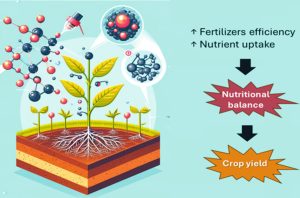A newly published book chapter co-authored by Dr. Jonas Pereira de Souza Jr., and Dr. Davie Kadyampakeni explores the potential of nanofertilizers in modern agriculture. The chapter appears in Nanofertilizers in Agriculture, a book from the publisher Springer Nature. “Potential of Nanoparticulate Fertilizers in Mitigating Environmental Stresses” explains how nanoparticles can enhance nutrient delivery, optimize crop uptake, and improve resilience against environmental stressors.
Nanotechnology Meets Agriculture

Nanofertilizers represent a significant shift in how nutrients are delivered to plants. Traditional fertilizers can result in nutrient loss due to leaching, volatilization, or runoff. In contrast, nanoparticles provide a more controlled release of nutrients. That ensures essential elements reach plants efficiently while minimizing environmental impact.
“This work underscores the potential of nanofertilizers as a significant step forward in plant nutrition,” said Dr. Souza Junior “By improving nutrient use efficiency, we can reduce losses, enhance soil fertility, and promote sustainable agricultural practices.”
One key focus of the chapter is how nanofertilizers can help crops withstand stressors, such as drought, salinity, and extreme temperatures. By delivering nutrients at a micro-scale, nanoparticles help plants maintain essential metabolic functions even under challenging conditions.
“Nutrient management is a critical factor in ensuring food security,” Dr. Kadyampakeni noted. “The ability of nanofertilizers to provide targeted nutrient delivery can help farmers manage soil fertility more effectively while mitigating environmental risks.”
Sustainable Agriculture
Beyond improving crop productivity, nanofertilizers contribute to sustainability by reducing the overall need for chemical inputs. The chapter highlights research showing that precise nutrient application through nanoparticles can significantly lower the environmental footprint of agriculture.
 “We hope this chapter inspires further research and innovation in plant nutrition and environmental sustainability,” said Dr. Souza Junior. “Nanotechnology has the potential to reshape how we approach soil fertility and crop resilience.”
“We hope this chapter inspires further research and innovation in plant nutrition and environmental sustainability,” said Dr. Souza Junior. “Nanotechnology has the potential to reshape how we approach soil fertility and crop resilience.”
“We hope this chapter inspires further research and innovation in plant nutrition and environmental sustainability,” he added.
Dr. Souza Junior and Dr. Kadyampakeni conduct their research in the UF/IFAS Department of Soil, Water, and Ecosystem Sciences at the Citrus Research and Education Center. Their co-authors are Dr. Renato de Mello Prado and Milton Garcia Costa, M.Sc., at University of Sao Paulo State, and Dr. Kamilla Silva Oliveira and Dr. Brenda Tubana at Louisiana State University. The book is available here: https://link.springer.com/book/10.1007/978-3-031-78096-7
Featured image from Dr. Souza Junior, created with AI via ChatGPT and Adobe Photoshop.
 4
4
